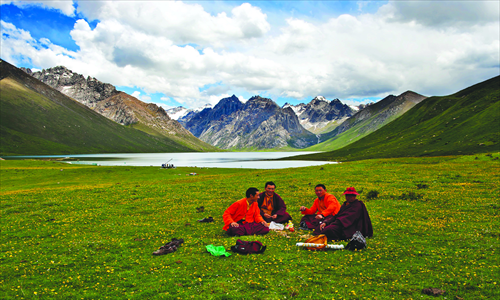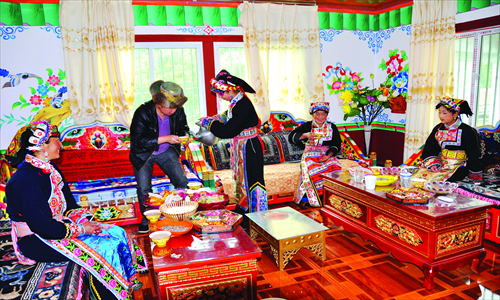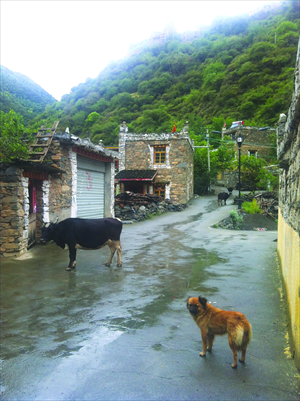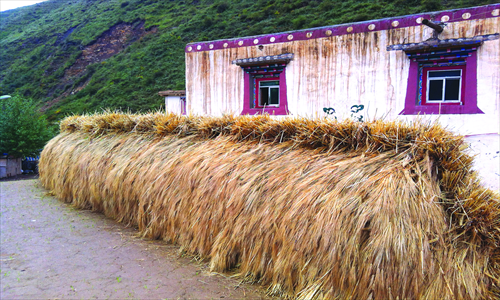Down from the hills they came

Tibetan herdsmen take a rest near Xiannü Lake, Jiuzhi county, Qinghai Province. Photo: CFP
Since Ergin came down from the hills in October 2009, he has tried hard to adjust to his new lifestyle, from being a herdsman who roamed freely and lived in a tent to becoming a farmer and herb collector living in a four-room house.
The family of five used to own about 20 yaks. They are Tibetan and lived some 3,000 meters above sea level around in Mêruma township, Aba county of the Aba Tibetan and Qiang Autonomous Prefecture in Sichuan Province.
The family - a couple, two children and Ergin's elderly mother - now lives on the seasonal crop of worm grass and offering room and board to occasional tourists who pass by.
Starting in 2009, the Sichuan provincial government released a new policy that offered Tibetan herdsmen in Aba prefecture settlements in the plains. According to the Aba prefecture government, the goal was to establish 608 new settlement villages by 2012 in the 11 counties, 136 townships and 527 villages concerned. This was meant to provide housing for a total of 41,457 families or 210,677 people. At the same time, the government provided tents for those who still wished to herd yaks.
The goal of the project was to improve herdsmen's lives and to reduce detrimental effects on the environment. As of this year, the project has been completed with the herdsmen seeming mostly content about giving up their past lifestyle and settling at lower altitudes.

Hostesses from a Tibetan family welcome a visitor to their home. Photo: Courtesy of the publicity bureau of the Aba Tibetan and Qiang Autonomous Prefecture
Changing lives
Hong Xiuquan is the head of a Tibetan household in Songgang township, Barkam county. The family of five once had about five or six cows, with no yaks or goats, and made a monthly living of about 900 yuan ($147) by planting corn. The local government, after the new policy to move herdsmen to settlements was announced, started building what was referred to as a "new rural village," at the foot of the hills and moved the 32 families down.
Hong made a smooth transition to being a farmer. The village government gave every family a one-time financial subsidy of 14,000 yuan to help start their house-building and settling process. "We have started agri-tourism, planting some vegetables, mainly Chinese cabbage, but also string beans as well," Hong said.
He feels his life has improved somewhat. "When I used to live in the mountains, the conditions were bad and there were only small dirt roads, cars couldn't make it up there. Now we have electricity, running water, telephones and better roads."
In Puxi township, Zamtang county, the residents have also seen changes since the policy was implemented.
Tashi, a 30-year-old former herdsman, moved down from the hills around the end of 2009. He now grows wood ear fungi for a living, which provides him with about 5,000 yuan a month in income, as opposed to about 2,000 yuan when he was a herder.
The area has an open field dedicated to testing and training former herdsmen in growing wood ear on a number of logs.
Chen Yonghua, from the provincial health department and charged with testing wood ear-growth in Puxi, said the point of the project is to help former herdsmen get on their own feet faster. "By having this training center, we help them learn how to grow fungi in their backyards, so those who are no longer herding can transition easily," he said.

Newly built houses for Tibetan herdsmen in Songgang township, Barkam county, Sichuan Province Photo: Zhang Yiqian/GT
Tashi said even though people are living at the foot of the hills, yaks remain on the heights. "In my family, some young people stayed down hill to grow wood ear, some left to find jobs, some went to school, and some who didn't want to change stayed behind to herd."
The Mêruma township chief, Chimi Donsar, said the five villages and about 3,000 people in the township have all been settled.
"There are a few people who stayed in the original spots to herd livestock," he said. "But in order to take care of the children and older people and make their lives more convenient, we moved them down."
Not many of the Tibetans interviewed spoke fluent Mandarin but the county or township governments provided translators. Those who talked with the Global Times spoke in the presence of about 20 other reporters organized on this government-provided reporting trip.
Besides improving the livelihoods of herders, the health benefits of such settlements brought have been excellent, said Guo Zhiping, the secretary of Wuyi township in Zamtang county. Being one of the worst-hit areas in China for Kaschin-Beck disease (KBD), an ailment that locks up the joints and limits range of motion, the change in lifestyle has been positive for sufferers.
Although the exact source of KBD remains uncertain, an altered and more varied diet as well as no longer sharing water sources with livestock seems to have had a positive effect. Cases among children have plummeted although around 60 percent of inhabitants in one village still suffered from the disease.

A grain storage space near a Tibetan farmstead in Zamtang county, Sichuan Province Photo: Zhang Yiqian/GT
On the other hand, the resettlement of Tibetans has always been controversial, not only in Sichuan but in other parts as well. In June, Human Rights Watch published a report titled "They Say We Should be Grateful": Mass Rehousing and Relocation in Tibetan Areas of China, accusing such policies of involving human rights violations that ranged from "the absence of consultation to the failure to provide adequate compensation."
"The scale and speed at which the Tibetan rural population is being remodeled by mass rehousing and relocation policies are unprecedented in the post-Mao era," the report quotes Sophie Richardson, China director of Human Rights Watch, as saying. "Tibetans have no say in the design of policies that are radically altering their way of life, and - in an already highly repressive context - no ways to challenge them."
Xiong Kunxin, a professor of ethnic theory and policy at the Minzu University of China, told the Global Times that he has heard a lot about such relocation policies, not only for Tibetans but with other ethnicities as well.
"From the government aspect, they bear no ill will, believing that moving from the mountain to the plains would provide them with a better life," he said. "But from the angle of Tibetans, if they've been living in certain ways and all of a sudden you change their environment, there might be some reluctance."
Xiong thinks the important thing is to have thorough discussions with herdsmen to explain the policy and the advantages of relocating. If the relocations are coerced, then such policies cannot benefit anyone, he said.
Guo clarified that they had a discussion with the herdsmen prior to the relocation and informed them the benefits of moving down, especially how it would help with the disease.
Fortunes and woes
According to the press release from Aba prefecture government, as of December 2011, 7.23 billion yuan had been invested on the settlement program, jointly funded by the government, the herders and bank loans. In the whole prefecture, 160 programs have been developed to help the economy, such as planting vegetables, fungi or fruits.
A Tibetan woman, Zhang Huiying, sits on the porch in the tourist area of Changping village, Rilong township in Xiaojin county. She and a couple of others living nearby used to have relatives who worked as herdsmen but they have transitioned to relying on tourism.
Zhang sells woolen shawls in a decorated tourism street that was built after the earthquake in Wenchuan, Sichuan Province in 2008. All the houses are brightly decorated in a Tibetan style and the people there wear traditional Tibetan clothes. All households sell shawls, yak meat in bags or some other Tibetan specialties and make money off tourists.
When asked whether the herdsmen could adapt to the new lifestyle, she simply stated the change was mandated by government policy. But she was quick to point out that the herdsmen's income increased after the move.
However, just as in Changping village, nobody appeared to be outside in Songgang township. Chen Xiaocong, working for the township government, said tourism has been affected by multiple mudslides this year, making the village emptier than usual.
"The mudslides didn't do any damage to the houses here, but they blocked some of the roads coming into Barkam county. But as soon as we have that repaired, the tourists will return," she said.
Hong also believes tourism is slowly picking up. "We would be happy if tourism started developing," he said. "We here are only starting the first stages of the industry. Now we have 14 families that are designated to be tourist reception families, it will get better when the business takes off."
Even though the policy has come under attack, the former herdsmen all expressed satisfaction that their current living conditions are better than when they were in the mountains. Ergin is content his children can have easier road access to schools and hospitals.
However, he wishes basic infrastructure could be improved. Right now, water and electricity run out sometimes, mostly due to bad weather with the water freezing in the pipes.
He is also trying to get accustomed to the lifestyle. "When I was a herdsman, we used to drink homemade milk tea," he said. "Now that we are living at a permanent location and don't have cattle anymore, it's quite inconvenient when it comes to food. Now we have to go into town and buy milk tea instead of making it ourselves."